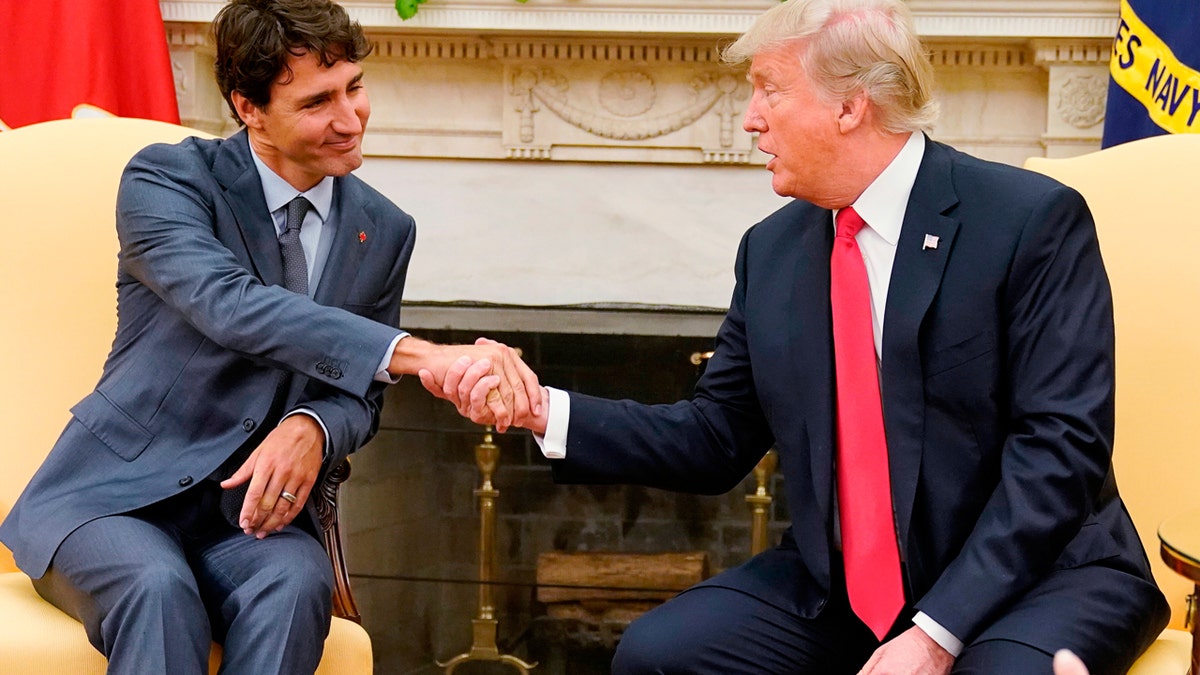
Despite the handshake, Canada's Prime Minister Justin Trudeau and U.S. President Donald Trump were not ready to announce progress on revising or replacing NAFTA, the North American Free Trade Agreement. (Reuters)
Few clues emerged from President Donald Trump’s meeting with Canadian Prime Minister Justin Trudeau on Wednesday about the uncertain future of the North American Free Trade Agreement (NAFTA).
"We're negotiating a NAFTA deal. It's time after all of these years and we'll see what happens. It's possible we won't be able to make a deal and it's possible that we will," Trump said.
Negotiations have struggled to gain momentum as the U.S. Chamber of Commerce cautioned that the Trump administration’s impractical requests could harm the talks.
But despite the U.S. threatening to withdraw from the agreement that’s been in effect since 1994, Trudeau remained optimistic that the U.S., Canada and Mexico can reach a "win-win-win" solution. Still, he said Canada would be "ready for anything."
The fourth round of NAFTA negotiations began Wednesday in Arlington, Va., and will continue through Tuesday.
NAFTA eliminated trade barriers between the U.S., Canada and Mexico to generate trade growth. But critics argue it also led to the downfall of U.S. manufacturing as companies moved across the southern border to take advantage of cheaper labor.
In order for the tri-lateral trade agreement to remain past its 23rd year, Trump has requested an increase in U.S auto production, more American companies securing government contracts in the NAFTA bloc, and for the agreement to be abolished altogether unless countries agree every few years to extend it. In addition, the administration is seeking eliminating dispute resolution processes.
Agriculture Secretary Sonny Perdue detailed some of the main issues with NAFTA, specifically where Canada is reaping more of the benefits than the U.S.
“The irritants that we have are primarily with Canada over their dairy management supply program. They are overproducing, creating depressing world prices for milk solids,” Perdue told FOX Business’ Trish Regan on The Intelligence Report. “There is also a wine issue in British Columbia where they are not letting our wines out front where their customers can choose.”
Perdue added that there are also issues with poultry access.
U.S. Chamber of Commerce President Thomas Donohue called Trump’s proposals “poison pills” for Canada and Mexico, which could result in the death of the agreement, Reuters reported.
Donohue co-chaired the U.S.-Mexico CEO conference Wednesday alongside Fedex Freight's CEO Michael Ducker. Guillermo Vogel, a steel company executive, co-chaired the event in Mexico, which included closed-door talks regarding NAFTA with Foreign Minister Luis Videgaray and Economy Minister Idelfonso Guajardo, who are responsible for Mexico’s involvement in the negotiations, Reuters reported.
Vogel emphasized the importance of negotiating a good deal, and told Reuters a “bad agreement” would be far worse than “with no NAFTA,” but recognized the end of the pact would be a “lose-lose” situation.
Farm groups and agricultural lobbies have urged the Trump administration to keep NAFTA, because if the U.S. were to leave the agreement, the agricultural industry would be slapped with potentially steep tariffs from Canada and Mexico.
If negotiations fail to reach a solution, Trump alluded to the possibility of having separate deals with Canada and Mexico.
“It's possible we won't be able to reach a deal with one or the other. But in the meantime, we'll make a deal with one," the president said.
In addition, during an interview with Forbes magazine published Tuesday, Trump appeared to favor eliminating the deal and said he likes “bilateral deals."
"I happen to think that NAFTA will have to be terminated if we're going to make it good. Otherwise, I believe you can't negotiate a good deal," Trump said.
Trudeau will head to Mexico on Thursday to continue talks regarding NAFTA.
The Associated Press contributed to this report.












































